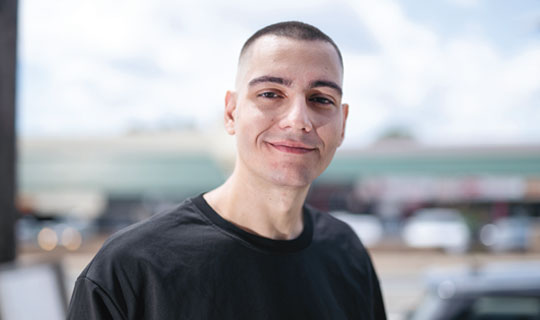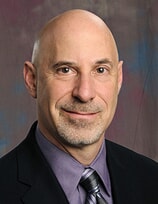I’m seeing life through a different lens now. I am more positive than I have ever been. If not for my doctors, I’m not sure how much longer I could have gone on.

New technology that enhances brain surgery frees a man from seizures.
For seven years, epileptic seizures have kept Christian Trucchio on “a leash,” he says, that has prevented him from truly living. Now, thanks to advanced technology at Robert Wood Johnson University Hospital (RWJUH), Christian is on his way to trading that leash for a new lease on life.
Christian was the first patient at RWJUH to benefit from the ClearPoint Navigation System. This advanced system provides surgeons doing neurological procedures with stereotactic guidance—a type of 3D MRI (magnetic resonance imaging).
The ClearPoint system helps with the planning and execution of neurological procedures. During surgery, it allows highly accurate placement or operationof instruments or devices, reducing the chances of damaging healthy brain tissue. The system’s latest software optimizes ease of use for clinicians, enhancing the visualization of medical images, providing new trajectory planning capabilities and introducing new workflow tools for clinical trials.
Consistent Precision
RWJUH surgeons used ClearPoint technology to treat Christian’s epilepsy with a laser ablation procedure.
Laser ablation is a minimally invasive technology that uses light energy to target an area of the brain responsible for triggering epileptic seizures. Laser beams are delivered to the target area using an MRI-guided probe that’s directed through a 3-millimeter hole in the skull. Energy from the probe heats the target, destroying unwanted tissue and leaving healthy tissue unharmed.
RWJUH is home to the state’s first intraoperative MRI, which allows the ClearPoint system to use real-time MRI images. Viewing MRIs during surgery eliminates the need to pause the procedure and take the patient out of the operating room for scans. This can shorten surgeries and reduce patients’ potential exposure to nonsterile surroundings.

“The ClearPoint system allows neurosurgeons to achieve the highest level of consistent, accurate precision of any tool available,” says Christian’s surgeon, Robert Gross, MD, PhD, Chief of Neurosurgery at RWJUH and Senior Vice President for Neurosurgical Services at RWJBarnabas Health. Dr. Gross also serves as joint chair of the Department of Neurosurgery at Rutgers Robert Wood Johnson Medical School and Rutgers New Jersey Medical School.
“ClearPoint allows direct visualization of whatever one is attempting to insert into the brain as it gets to its intended target, using the power of MRI,” Dr. Gross says.
In addition to enabling laser ablation, ClearPoint can be used in other ways such as supporting deep brain stimulation and delivering gene and cell therapies to the brain. “Its uses span Parkinson’s disease, Huntington’s disease, epilepsy, brain tumors, psychiatric disorders, pain, Alzheimer’s disease and others,” says Dr. Gross.
A Clearer Mind
Christian’s family has a history of epilepsy: Both his mother and grandmother experienced seizures, and his mother’s death at 47 may have been linked to her condition.
Shortly after her death, Christian’s long, difficult journey with epileptic seizures began. Over a brief period, he also lost his grandmother and uncle along with the family cat. The high stress may have helped trigger his seizures. Episodes became so severe that he lost two jobs, leading his family to move from New York City to New Jersey.
While doctors initially could manage his condition with medications and he was able to return to work, his seizures grew increasingly worse. By the time of the COVID-19 pandemic, seizures that had occurred once every two to six months were happening as often as once every two weeks, Christian says.
Once in New Jersey, Christian found a neurologist at Cooperman Barnabas Medical Center who recognized that Christian’s medication regimen was becoming less effective. He thought Christian might be a good candidate for laser ablation and referred him to Dr. Gross.
After meeting with Dr. Gross, Christian became confident that laser ablation was right for him. “He said laser ablation was a minimally invasive option with relatively fast recovery time,” Christian recalls.
Dr. Gross performed the procedure in April 2024. Christian has effectively been seizure-free ever since. “I feel much more mental clarity now,” he says.
His doctors continue to monitor him and hope to reduce the number of medications he takes. “The goal is no seizures and less meds,” Christian says.
Now on disability, Christian looks forward to returning to work and a more active lifestyle that includes skating, handball and a greater variety of daily activities.
“I really want to drive again,” he says. “But I’m seeing life through a different lens now. I am more positive than I have ever been. If not for my doctors, I’m not sure how much longer I could have gone on.”
Learn more about Neurosurgery at RWJBarnabas Health.
Learn more about the ClearPoint Navigation System and ROSA ONE® Brain system.
 View full issues of Healthy Together magazine by New Jersey region:
View full issues of Healthy Together magazine by New Jersey region: